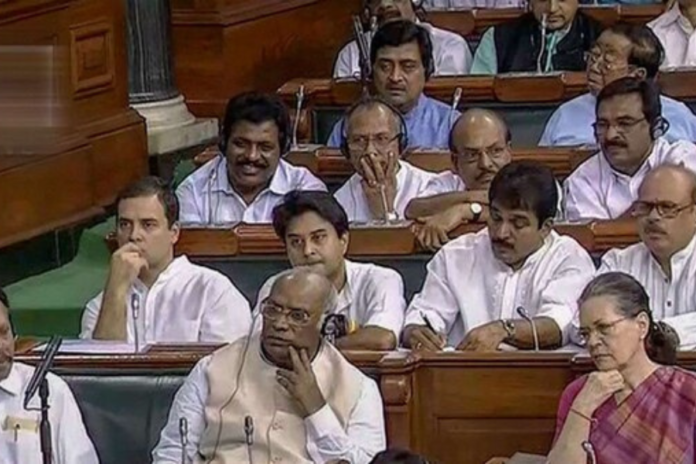The results of the assembly elections 2023 are in, and the drama has already begun to tell a new, frightening story. In the realm of Indian politics, a dangerous trend has reappeared: the separation of India into North and South states based on geographical boundaries. The Indian National Congress (Congress), the Dravida Munnetra Kazhagam (DMK), the BRS (Bharat Rashtra Samithi), and other political parties in South India are pushing this divisive agenda, which suggests that the BJP (Bharatiya Janata Party) will be the main target of debilitation in the region during the next general elections in early 2024.
But this misguided attempt to create discord and polarisation among Indian voters is not only unacceptable—it also indicates that the Opposition is losing faith in morality and national sovereignty.
Senthil Kumar, a DMK MP in the Lok Sabha, recently called people from North India “gaumutra drinkers” at the ongoing Winter Session of Parliament. His remarks are a new low for the national discourse in modern India. These derogatory comments demonstrate the lengths to which the opposition parties will go in their pursuit of immediate political advantage. The Opposition’s use of such polarising tactics reveals their unease and unwillingness to accept their bad luck.
There is a worrying increase in anti-Hindu actions in Tamil Nadu, the birthplace of Dravidian parties, as well as the spread of divisive religious slogans in educational institutions. This unfavourable tilt indicates illness for a long time, therefore voters are urged to carefully study their options before casting a ballot. The ground truth presents a different picture from the opposition’s attempts to portray the BJP as a party exclusive to North India.
With 29 Members of Parliament and a recent majority government in Karnataka, the BJP has emerged as the largest party in South India. Not only that, but the BJP has effectively doubled its vote share in Telangana and is in control of Puducherry. The victory of KV Ramana Reddy, the BJP, against Telangana’s current chief minister and Revanth Reddy, the party’s nominee for chief minister, may reinforce the party’s growing influence in South India.
The Opposition led by Congress has previously attempted to portray the North as communal and the South as non-communal. The aggressive statements made by AIMIM (All India Majlis-E-Ittehadul Muslimeen) leader Akbaruddin Owaisi and the disgusting remarks made by DMK leader Udhayanidhi regarding Sanatana Dharma are two blatant examples of communal hatred, with the Congress remaining silent. Sadly, the Congress actively fosters these incidents of Hinduphobia in order to capitalise on them politically.
Examining the historical context reveals that such polarising political goals are not an idle curiosity. In order to gain as many votes as possible, Congress used a divide and conquer strategy to distance Hindus from other religious communities during the post-independence era. Additionally, they promoted and deepened differences among Hindus by using caste and the virtues of devoutness. This strategy, which sought small-scale political advantage, seriously damaged the Hindu community’s social fabric. They also used minority appeasement as a divisive tactic, which caused Hindus to become estranged.
The accusation of narrow-mindedness and the moniker “Saffron terror” were attempts to silence critics of such divisive tactics. The global perception of Hindus has been tarnished by these ploys, even though their character is inherently gregarious, accepting, and peaceful.
The Congress has been using abusive techniques based on education, religion, aesthetics, and personal preferences, which is concerning because it undermines the legitimacy and decisiveness of the Indian electorate. Prime Minister Narendra Modi responded by taking a jab at Congress on X (previously Twitter) and appropriately cautioning against their divisive agenda. He emphasised the wisdom of these people to discern and also made note of the ongoing challenge of overcoming a 70-year-old custom.
The damage produced by a long history of divided politics is irreversible, despite the opposition parties’, particularly the Congress party’s, vile attempts to mend their reputation with public visits to Hindu temples. The current effort by the Opposition to create a North vs. South dispute is only one more chapter in the book of contentious legislative problems that have plagued India’s political landscape. It is crucial for us as citizens to recognise these tactics and make informed decisions that uphold the intelligence and cohesion of our country.
Finally, the growing discontent of the Opposition can be seen in their desperate attempts to draw a line between North and South India and to attribute political defeats to the Hindu community. This unhappiness was heightened by the BJP’s significant electoral wins in the northern states, which prompted opposition parties to attack the BJP’s national identity. In order to maintain their political positions, opposition groups are pursuing a divisive agenda in light of the anticipated results of the next legislative elections. Nonetheless, the BJP’s steadily increasing power in southern India, a region known for its cohesiveness and cultural coherence, is an indication of its rising acceptance.
India is likely to reject such divisive measures, reiterating its resolve to unifying the nation under the banner of “Ek Bharat-Shreshth Bharat”. India has long rejected regional divisions.



